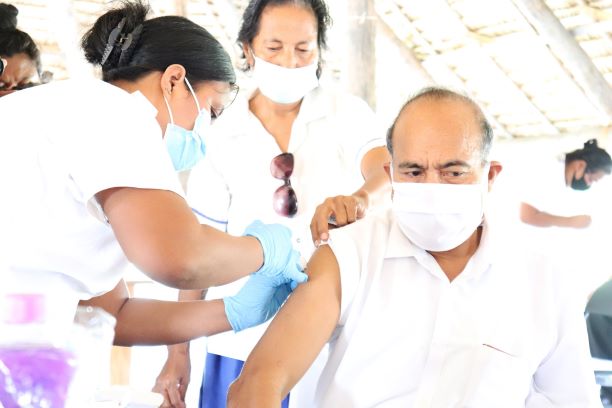Pacific islands members of the World Trade Organisation are being urged to support a proposal designed to make COVID-19 vaccines more available to developing countries.
Fiji and Vanuatu have already joined as sponsors of the proposal, which was first made by India and South Africa last year. It seeks to waive certain Trade-Related Aspects of Intellectual Property Rights (TRIPS) obligations for the prevention, treatment, and containment of COVID-19.
It would see the removal of some intellectual property barriers that are inhibiting the widespread production of vaccines. The waiver request also includes COVID-19 tests, treatments and personal protective equipment (PPE), albeit only for the duration of the pandemic. This is important in the Pacific, where countries are unable to do mass testing. Fiji had to send 11,000 swabs to Australia for processing last month after a COVID outbreak at the Centre for Disease Control.
The WTO waiver needs unanimous approval. But at this point, there’s no consensus on the issue, with opponents to the waiver saying it is unnecessary and could undermine ongoing collaborative, and research and development efforts.
Papua New Guinea, Solomon Islands, Samoa and Tonga are also members of the WTO. They are being urged by a coalition of Pacific civil society organisations—the Pacific Conference of Churches, Pacific Islands Association of Non-Government Organisations, Pacific Disability Forum and Pacific Network on Globalisation (PANG)—to join the call for a waiver.
“As a region, I think the Pacific standing with other countries, and particularly those other countries who are really hurting, like India and others with COVID, is a great show of solidarity in a globe that is increasingly dealing with large scale issues like climate change,” says PANG Campaigner, Adam Wolfenden.
“For the Pacific, there is a strong moral imperative to support this waiver. But there are also practical on the ground impacts that getting the waiver through the WTO will have in terms of greater availability of vaccines, greater availability of protective clothing. All those things contribute to helping the Pacific get through COVID and having a global response that allows us to overcome this challenge and not have to just be constantly dealing with mutations of the virus and having this rolling tragedy that is COVID-19,” he says.
The move is supported by the World Health Organisation. WHO Director-General Tedros Adhanom Ghebreyesus says: “The inequitable distribution of vaccines is not just a moral outrage. It’s also economically and epidemiologically self-defeating. Some countries are racing to vaccinate their entire populations — while other countries have nothing.”
Tedros Ghebreyesus said the situation in Papua New Guinea was “a perfect example of why vaccine equity is so important.”
“With rising infections, understandable fatigue with social restrictions, low levels of immunity among the population and the fragile health system, it’s vital that it receives more vaccines as soon as possible.”
Rollout of the AstraZeneca vaccine in PNG started in late March. Australia donated the initial 8000 doses. 132,000 have since arrived through COVAX.
Médecins Sans Frontières Australia claims PNG could have received COVID-19 vaccines earlier if Australia had not been part of a group of countries that blocked the WTO proposal.
The Australian government has played a critical role in getting vaccines into many Pacific island nations. However it has not supported the WTO action, with Australia’s trade minister Dan Tehan telling ABC Radio last month: “We’ve got to make sure that there are some protections in place for the millions of dollars that has gone into the research to create these vaccines”.
However public funding of vaccine development and testing globally has been estimated at almost US$4 billion. Supporters of the waiver also point to the intellectual property (IP) waivers that were granted at the height of HIV/AIDS, which ensured more people could access life-saving drugs.
They’re also concerned about the long-game. While Pacific Island nations are now seeing the steady arrival of vaccines—albeit at widely varying rates—some manufacturers are now claiming there will be a need for annual booster shots or new vaccines to deal with variants, although some health specialists have questioned this.
“We don’t see the data yet that would inform a decision about whether or not booster doses are needed,” Kate O’Brien, WHO’s director of the Department of Immunization, Vaccines and Biologicals has told Reuters.
Meanwhile discussion at the WTO continues.
